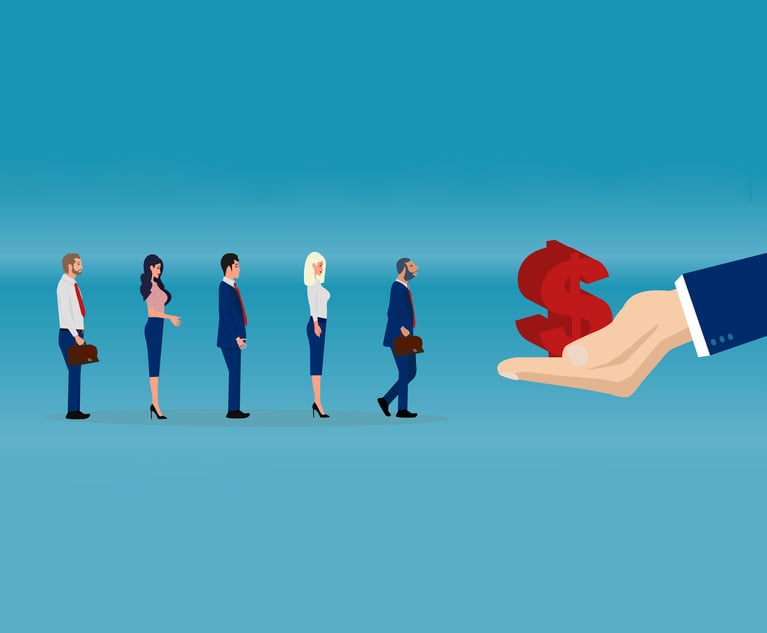 Credit: Menara Grafis/Shutterstock.com
Credit: Menara Grafis/Shutterstock.comLaw.com Trendspotter: The Meaning of 'Meeting' Has Changed for Good—and, Arguably, for the Better
"I believe this recession will be looked back upon and known as the bursting of the bullshit bubble," one legal industry advisor said. "All the things that we say we needed, must do, and have no choices about turned out to be bullshit. And, there is no looking back."
July 06, 2020 at 12:43 AM
7 minute read
The Trend:
With COVID-19-caused office closures and stay-at-home orders still lingering in most of the country, legal professionals have been forced to reevaluate industry norms that, as recently as March, seemed to be set in stone. Chief among those conventions is the way in which lawyers and legal professionals interact with each other and their clients.
Having a meeting truly no longer requires actually meeting, and that concept has been freeing for many in the profession. There will always be a time and a place for in-person interaction, but those times and places have become fewer and farther between, and that trend seems likely to stick, even post-pandemic.
The Driver:
The initial impetus, of course, was the pandemic. But the real engine behind this trend has been the success (and attendant cost savings) of remote work, which has dispelled a number of long-held legal industry myths about "the way things must be done," including meeting with clients and colleagues. In a profession in which time is literally money, it's becoming clear that virtual meetings have the potential to save a considerable amount of both.
As legal industry advisor Darryl Cross, head of Rainmaker Fitness and HighPer Teams, put it to me so beautifully when I asked for feedback on this issue in a recent Morning Minute item: "I believe this recession will be looked back upon and known as the bursting of the bullshit bubble. All the things that we say we needed, must do, and have no choices about turned out to be bullshit. And, there is no looking back."
Of course, while a shift toward more remote meetings and less time-and-money-consuming travel is arguably for the better and perhaps even long overdue, it's not without drawbacks.
The Buzz:
>> Few legal industry positions require more travel than that of the managing partner—particularly if they're overseeing a sizable firm with far-flung offices and a national or international client base. But as Patrick Smith recently reported, even the most itinerant law firm leaders have been forced to reconsider whether life on the road (and in the air) is really necessary.
While the in-person meeting appears to be in no danger of becoming completely extinct, it's also clear that, even after the pandemic subsides, it will be de-emphasized to some degree.
>> Patrick's article spurred me to pose a question to Morning Minute readers last week: "Are you eager to get back to in-person meetings or are you ready to stay in a virtual reality?" While not everyone said they were ready to swear off traveling to in-person meetings for good, the responses I received cemented for me that being forced to cut back on facetime in favor of FaceTime has caused a shift in thinking throughout the profession.
"The last few months of Zoom and WebEx meetings have proven that remote meetings can be effective and save time and money," Steven Weinstein, managing partner of the K&L Gates' Miami office, said. "It has been nice not having to deal with the hassles of commuting and travel. However, I do not believe they can or should replace in-person meetings. Virtual meetings simply do not have the energy and dynamic of in-person meetings. Our future holds a place for both."
Steve Zack, the Miami administrative partner of Boies Schiller Flexner and a member of the firm's executive committee, echoed that sentiment: "My personal experience is that it never made much sense to spend three days to take a one-hour deposition in Chicago; one day going, one day coming and one day sitting at the airport. But I certainly miss the in-person interactions, which hopefully will return one day soon."
Darryl Cross, the aforementioned legal industry advisor, had a more emphatic take, noting that he began working in the industry in 1997 and has spent two to three days per week on the road ever since.
"I will not be going back to it," he said. "I miss the conferences, but I do not miss flying from DC to LA to go to lunch. I miss smiling and catching up over drinks at a hotel lobby bar, but I do not want to miss any more days with my aging parents, wonderful daughter, and rapidly growing granddaughter. I miss seeing the world, but I do not miss not knowing what is going on in my own neighborhood."
Meanwhile, Fort Lauderdale bankruptcy attorney Chad Van Horn, managing partner of the Van Horn Law Group, noted that it's not only in-person meetings in other time zones that can cause stress and cost time and money. Meetings and hearings across town can be a burden in there own right, he said.
He also added another important perspective: the client's.
"In the world of bankruptcy law, mandatory 341 meetings at the courthouse with creditors are much more efficient via phone/Zoom for clients and attorneys," he said, referring to Section 341 of the Bankruptcy Code, which requires debtors to meet with and answer questions from their creditors. "Virtual meetings eat up less time, allowing the client to work most of the day verses taking off a full day. Plus, the time slots for 341 meetings typically encompass up to a dozen cases with parties and bankruptcy lawyers being called up one by one. A Zoom call offers more privacy and less embarrassment than having to appear in person and sharing personal business in a room full of strangers. Of course, important, evidentiary hearings should be held in person, but most hearings/meetings can be accomplished equally if not better via telephone or Zoom. Personally, however, I do miss the camaraderie of connecting with friends and colleagues in a court setting."
>> Virtual meetings may be convenient and cost-effective, but they're not always conducive to productive conversations.
As Vivia Chen recently reported, 45% of respondents to a recent survey of 1,100 U.S. business leaders and employees by nonprofit Catalyst attested that "it's difficult for women to speak up in virtual meetings," an observation agreed to by 42% of male leaders. In addition, one in five women reported feeling "ignored and overlooked by coworkers during video calls."
Especially when it comes to video conference calls, there are unique dynamics to consider and issues that need to be addressed if virtual meetings are going to be permanently woven into the fabric of business operations.
>> Young lawyers may be more tech-savvy, but not all of them feel they can excel in a virtual world.
Victoria Hudgins recently reported that some younger attorneys worry that less in-person interaction with clients, colleagues and senior partners will hinder their careers.
Donovan Bonner, who started at Coblentz Patch Duffy & Bass as an associate during COVID-19, told Hudgins that making introductions and building rapport is difficult when working remotely and can negatively impact an associate's path to partnership. "I think that physical interaction and casualness helps, and you get more work from that," he said.
Critton Luttier Coleman associate Santo DiGangi added, "I do think it is beneficial for young attorneys to be in the office, especially when they work with older lawyers that don't understand technology as well."
"There's a culture established in them [firms] and it's harder to break," DiGangi said. "It will take pioneers to bring that change. It's possible, but I don't see it happening in the near future."
|This content has been archived. It is available through our partners, LexisNexis® and Bloomberg Law.
To view this content, please continue to their sites.
Not a Lexis Subscriber?
Subscribe Now
Not a Bloomberg Law Subscriber?
Subscribe Now
NOT FOR REPRINT
© 2024 ALM Global, LLC, All Rights Reserved. Request academic re-use from www.copyright.com. All other uses, submit a request to [email protected]. For more information visit Asset & Logo Licensing.
You Might Like
View All
The Coming of Trump's Judicial Picks Spurs Liberals to Press for Biden's

Court Rules Mere Conduit Defense Not Suitable for a Motion to Dismiss
6 minute read

Big Law Expected To Follow Milbank's Lead With Associate Year-End Bonuses
Law Firms Mentioned
Trending Stories
- 1Elon Musk Names Microsoft, Calif. AG to Amended OpenAI Suit
- 2Trump’s Plan to Purge Democracy
- 3Baltimore City Govt., After Winning Opioid Jury Trial, Preparing to Demand an Additional $11B for Abatement Costs
- 4X Joins Legal Attack on California's New Deepfakes Law
- 5Monsanto Wins Latest Philadelphia Roundup Trial
Who Got The Work
Michael G. Bongiorno, Andrew Scott Dulberg and Elizabeth E. Driscoll from Wilmer Cutler Pickering Hale and Dorr have stepped in to represent Symbotic Inc., an A.I.-enabled technology platform that focuses on increasing supply chain efficiency, and other defendants in a pending shareholder derivative lawsuit. The case, filed Oct. 2 in Massachusetts District Court by the Brown Law Firm on behalf of Stephen Austen, accuses certain officers and directors of misleading investors in regard to Symbotic's potential for margin growth by failing to disclose that the company was not equipped to timely deploy its systems or manage expenses through project delays. The case, assigned to U.S. District Judge Nathaniel M. Gorton, is 1:24-cv-12522, Austen v. Cohen et al.
Who Got The Work
Edmund Polubinski and Marie Killmond of Davis Polk & Wardwell have entered appearances for data platform software development company MongoDB and other defendants in a pending shareholder derivative lawsuit. The action, filed Oct. 7 in New York Southern District Court by the Brown Law Firm, accuses the company's directors and/or officers of falsely expressing confidence in the company’s restructuring of its sales incentive plan and downplaying the severity of decreases in its upfront commitments. The case is 1:24-cv-07594, Roy v. Ittycheria et al.
Who Got The Work
Amy O. Bruchs and Kurt F. Ellison of Michael Best & Friedrich have entered appearances for Epic Systems Corp. in a pending employment discrimination lawsuit. The suit was filed Sept. 7 in Wisconsin Western District Court by Levine Eisberner LLC and Siri & Glimstad on behalf of a project manager who claims that he was wrongfully terminated after applying for a religious exemption to the defendant's COVID-19 vaccine mandate. The case, assigned to U.S. Magistrate Judge Anita Marie Boor, is 3:24-cv-00630, Secker, Nathan v. Epic Systems Corporation.
Who Got The Work
David X. Sullivan, Thomas J. Finn and Gregory A. Hall from McCarter & English have entered appearances for Sunrun Installation Services in a pending civil rights lawsuit. The complaint was filed Sept. 4 in Connecticut District Court by attorney Robert M. Berke on behalf of former employee George Edward Steins, who was arrested and charged with employing an unregistered home improvement salesperson. The complaint alleges that had Sunrun informed the Connecticut Department of Consumer Protection that the plaintiff's employment had ended in 2017 and that he no longer held Sunrun's home improvement contractor license, he would not have been hit with charges, which were dismissed in May 2024. The case, assigned to U.S. District Judge Jeffrey A. Meyer, is 3:24-cv-01423, Steins v. Sunrun, Inc. et al.
Who Got The Work
Greenberg Traurig shareholder Joshua L. Raskin has entered an appearance for boohoo.com UK Ltd. in a pending patent infringement lawsuit. The suit, filed Sept. 3 in Texas Eastern District Court by Rozier Hardt McDonough on behalf of Alto Dynamics, asserts five patents related to an online shopping platform. The case, assigned to U.S. District Judge Rodney Gilstrap, is 2:24-cv-00719, Alto Dynamics, LLC v. boohoo.com UK Limited.
Featured Firms
Law Offices of Gary Martin Hays & Associates, P.C.
(470) 294-1674
Law Offices of Mark E. Salomone
(857) 444-6468
Smith & Hassler
(713) 739-1250








